Dún Aonghasa Fort on Inis Mór Island is truly a sight to behold.
Perched on the side of towering cliffs on the largest of the Aran Islands in Galway, Dún Aonghasa is believed to have been built during the 2nd century BC.
Its location is as dramatic as they come and it’s likely for this reason that it was used as a Banshees of Inisherin filming location.
Below, you’ll find info on everything from its history and how to reach it to several warnings to take note of.
Some quick need-to-knows about Dún Aonghasa on Inis Mór
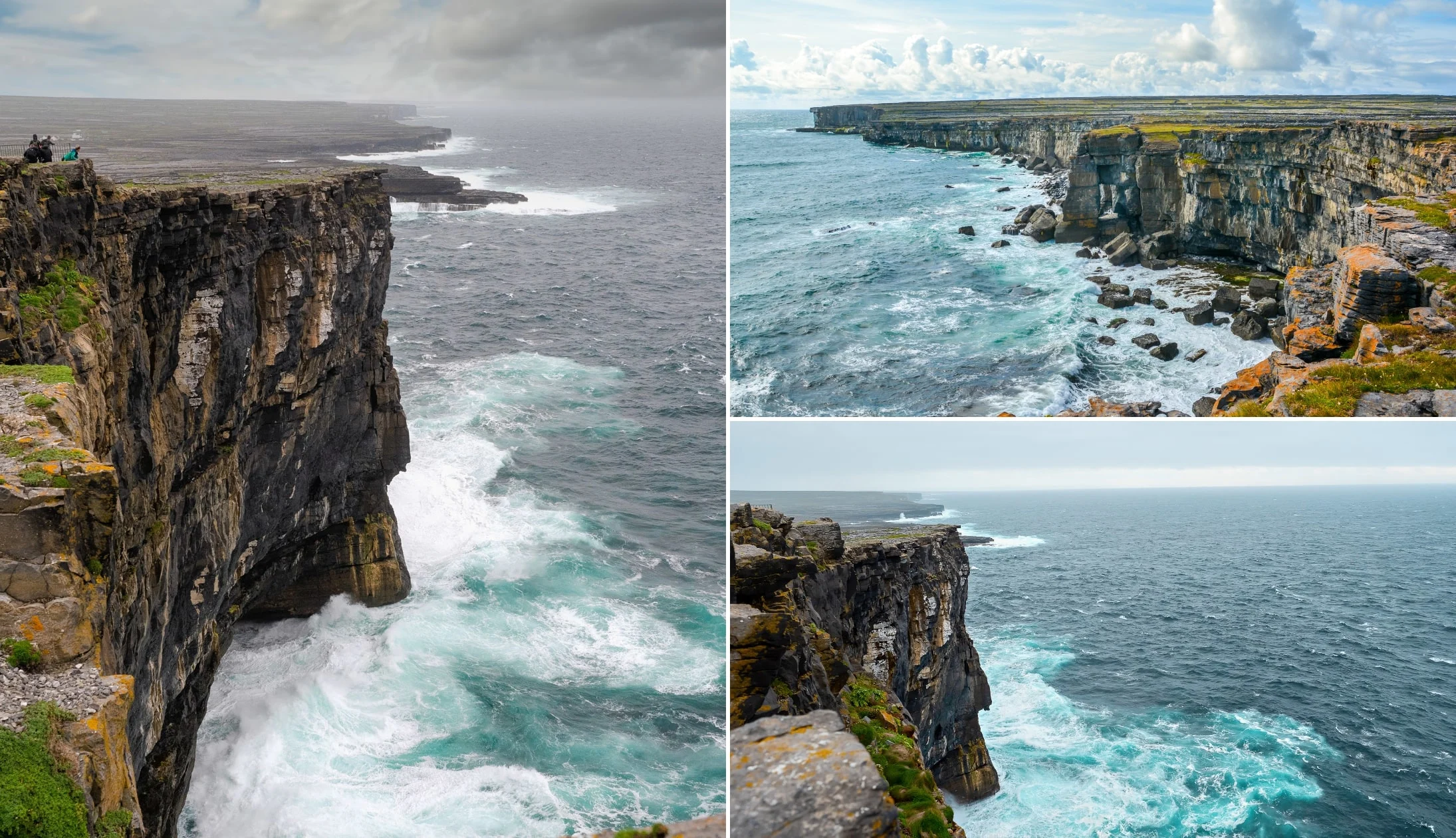
Photos via Shutterstock
Although a visit to Dún Aonghasa is a little less straightforward than many of the more popular Galway attractions, is fairly handy to get to, once you plan ahead.
Below, you’ll find some quick need-to-knows, the most important of which is the location and how to reach it.
1. Location
You’ll find Dún Aonghasa on Inis Mór Island off the coast of Galway. Inis Mór is the largest of the three islands (Inis Oirr and Inis Meain are the other two).
2. Getting to the island
If you take the ferry from Galway to the Aran Islands or the ferry from Doolin to the Aran Islands, you’ll be left at the pier on Inis Mór. You can then either walk or cycle to Dún Aonghasa (more info below).
3. Entry fee
Although there’s free entry if you stay on the island (only applicable to some Inis Mor accommodation providers), a fee applies to those visiting the island for the day. This can be paid at the Dún Aonghasa visitor centre:
- Adult: €5.00
- Group/Senior: €4.00
- Child/Student: €3.00
- Family: €13.00
4. The walk to the fort
It’s a 1km walk to Dún Aonghasa from the visitor centre and the route is over very rough ground and rock, so good footwear is required. It takes between 20-30 minutes to walk each way, depending on pace.
5. The Banshees of Inisherin
Dun Aonghasa was one of a number of The Banshees of Inisherin filming locations on Inis Mór. It was where Dominic and Pádraic was chatting near the cliffs and it was also seen in the background near Pádraic and Siobhán’s cottage.
The history of Dún Aonghasa
You’ll find Dún Aonghasa (anglicized Dun Aengus) on Inis Mór, the largest of the mighty Aran Islands, at the mouth of Galway Bay.
Dún Aonghasa is one of a number of prehistoric hill forts that are scattered across the three Aran Islands.
However, it stands out from the crowd thanks to its dramatic location on the side of a 300-foot high cliff.
When it was built
Although Dún Aonghasa’s date of construction is unknown, it’s widely believed that much of the structure was built between the Bronze Age and Iron Age.
It’s believed, it’s believed that the fort was constructed during the 2nd century BC by the Builg – ancient people who are believed to have resided in southern Ireland.
Evidence of life at the fort
Excavations carried out at Dún Aonghasa in the ’90s revealed that people lived at/near the fort from c.1500 BC.
It’s believed that the first walls and dwellings were erected c.1100 BC. Imagine sleeping here for a night, never mind a lifetime.
It once sat 3,000+ feet above the sea
The fort is made up of four dry stone walls and a gorgeous network of defensive stones that date back to c.700bc surround the entire structure (see photo above).
When Dún Aonghasa was originally built, sea levels were much lower, and it’s thought that the fort could have sat 3,000+ feet above the chilly waters below.
How to get to Dún Aonghasa
Getting to Dún Aonghasa is fairly straightforward once you have a sense of the lay of the land on Inis Mór.
There’s a few things to consider – take 20 seconds to read the below points as they’ll save you hassle in the long run.
1. Decide how you’ll get around Inis Mór
When you arrive onto Inis Mór from either Galway or Doolin you’ll need to decide how you’ll get around the island. There are several options:
- Bike hire from the pier (the cycle from the pier to the visitor centre is between 20 – 30 minutes
- Walk (it’s around a 1 hour and 45 minute walk from the pier to the fort)
- Taxi (it’s a 12-minute drive to the visitor centre)
2. Make your way to the visitor centre
Aim for the visitor centre and, if you’re feeling peckish, stop at the brilliant Teach Nan Phaidi nearby.
Pay the entry fee and then follow the clear track to the start-point of the trail.
3. Mind your step
The trail to Dún Aonghasa takes you across rough and uneven land. This shouldn’t prove too difficult for most, but mind your step.
The latter part of the trail, as you approach Dún Aonghasa, involves walking up a slightly steep ‘hill’. If you have decent mobility this shouldn’t be too difficult.
4. Stay well clear of the cliff edge
It’s tempting to get right up to the edge of the cliffs near Dún Aonghasa, but please refrain from getting too close.
The cliffs are unfenced and the wind here can be incredibly powerful. Be particularly careful if travelling with kids.
Things to see and do near Dún Aonghasa
One of the beauties of visiting Dún Aonghasa is that it’s a short spin away from a clatter of other attractions, both man-made and natural.
Below, you’ll find a handful of things to see and do a stone’s throw from Dún Aonghasa (plus places to eat and where to grab a post-adventure pint!).
1. The Wormhole
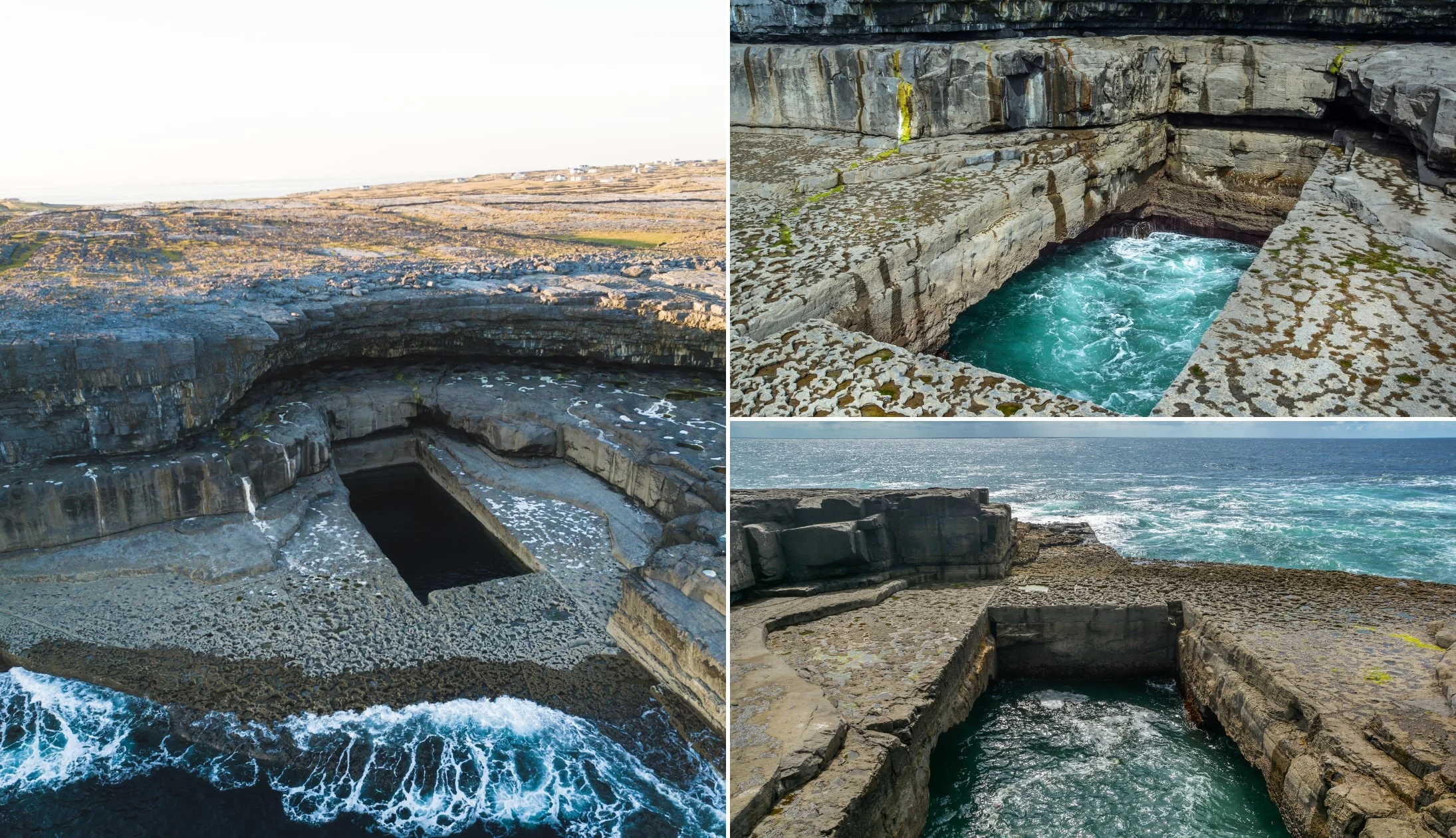
Photos via Shutterstock
If you’re visiting Dún Aonghasa fort, make sure to carve out some time to visit the nearby Wormhole.
A visit here is arguably one of the most unique things to do in Ireland. Find out everything to know about the Wormhole on Inis Mór.
2. Many other Inis Mor attractions
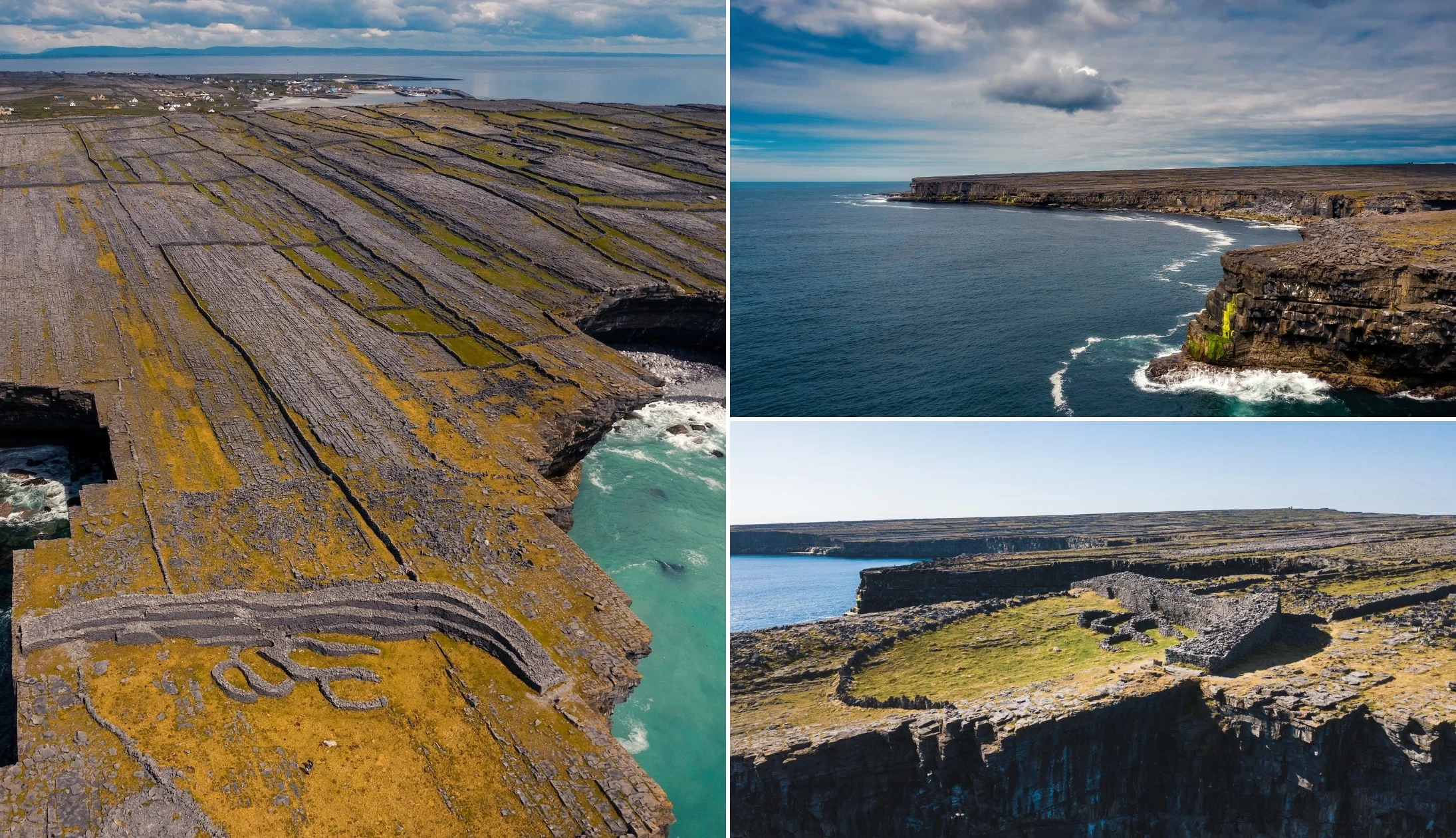
Photos via Shutterstock
There’s heaps of things to do on Inis Mor, from walks and hikes to historical sites and more, as you’ll discover if you hop into this guide.
There’s also loads of places to stay, if you fancy making the island your base for a few nights. Dive into our Inis Mor accommodation guide to discover some great places to stay.
3. Inis Oirr
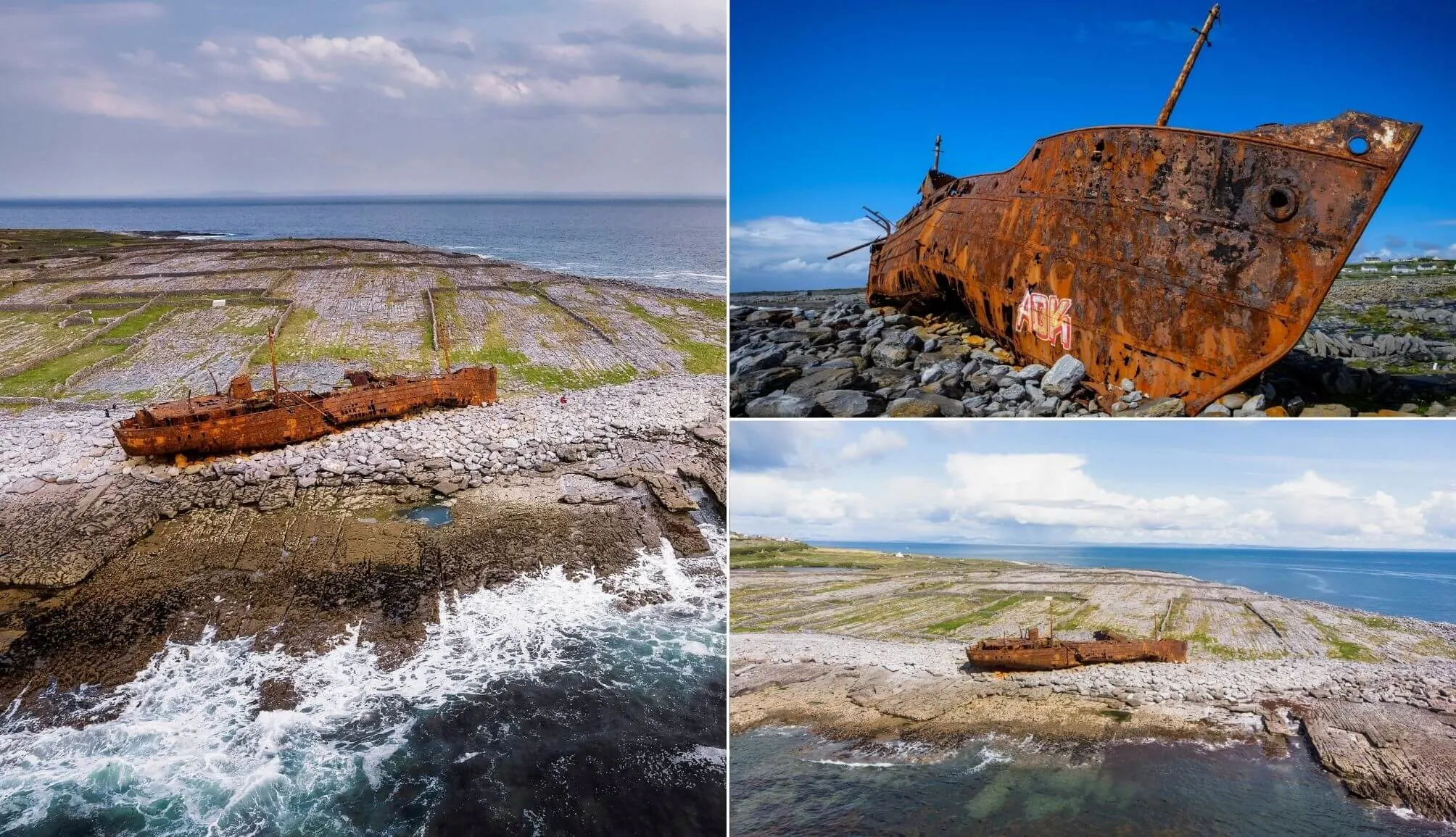
Photos via Shutterstock
When you’ve had your fill of Dún Aonghasa and Inis Mor, it’s well worth taking a ferry to the smallest Aran Island – Inis Oirr.
There’s loads of things to do on Inis Oirr and the island is well worth a visit.
4. Inis Meain
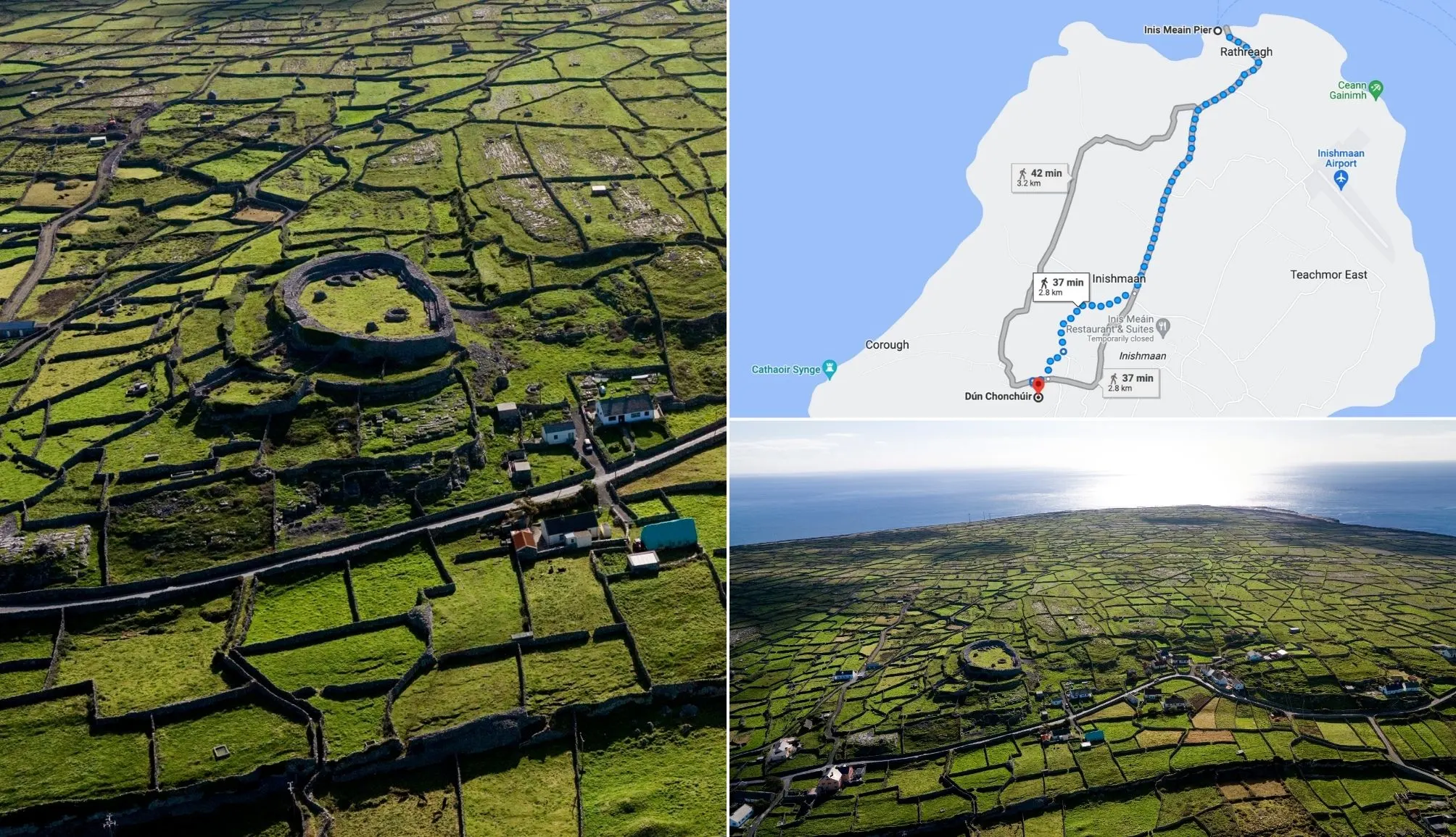
Photos by Chris Hill via Ireland’s Content Pool
Inis Meain (the middle island) is another spot that’s worth taking a ferry over to. Although there’s less to see here, there’s still plenty of worthwhile things to do on Inis Meain.
FAQs about visiting Dun Aengus
We’ve had a lot of questions over the years asking about everything from how to get to the fort to when it was build.
In the section below, we’ve popped in the most FAQs that we’ve received. If you have a question that we haven’t tackled, ask away in the comments section below.
What does Dun Aonghasa mean?
Dun Aonghasa translates to ‘Fort of Aonghas’. Although there’s no definite confirmation about who Aonghas but it’s thought that he may have been a God often referred to in Irish mythology.
How do I get to Dún Aonghasa?
The island is reached by ferry from Doolin or Rossaveal or via plane. Once you land on the island, you can either walk to the fort or rent a bike and cycle to it.
How old is Dun Aonghasa?
Dun Aonghasa is believed to be a staggering 3,000 years old. This has been confirmed via excavations that unearthed evidence of burials and prehistoric metalwork.
Keith O’Hara has lived in Ireland for 35 years and has spent most of the last 10 creating what is now The Irish Road Trip guide. Over the years, the website has published thousands of meticulously researched Ireland travel guides, welcoming 30 million+ visitors along the way. In 2022, the Irish Road Trip team published the world’s largest collection of Irish Road Trip itineraries. Keith lives in Dublin with his dog Toby and finds writing in the 3rd person minus craic altogether.

